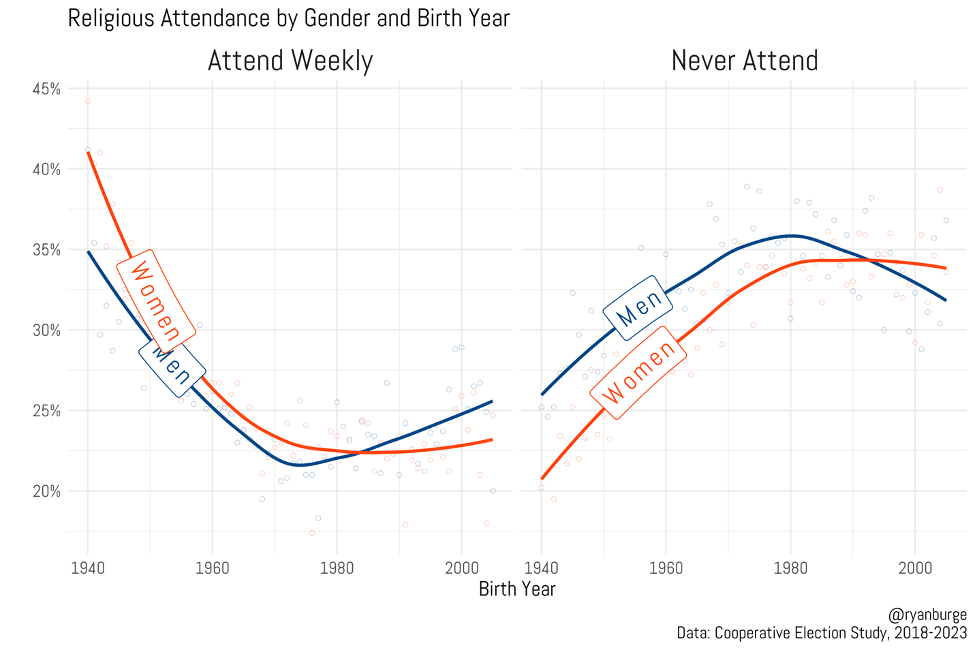There are certain universal truths that everyone knows to be true:
- If you’re running late, something will always make you even later.
- Your iced latte at Starbucks will contain more ice than coffee.
- Pineapple doesn’t belong on pizza.
Among statisticians there is another truth that is universally acknowledged: Women are more religious than men.
This statistic bears out across cultures, it’s certainly not just a Western trend. Historically women are more likely to identify with and practice Christianity.
Until recently.
“For the first time in modern American history, young men are now more religious than their female peers. They attend services more often and are more likely to identify as religious.” – Ruth Graham
Recently Ruth Graham, a journalist at the New York Times, published a report about how this trend is playing out in the college town of Waco, Texas. But her anecdotes hold true across for GenZ beyond Texas.
She explains:
Church membership has been dropping in the United States for years. But within Gen Z, almost 40 percent of women now describe themselves are religiously unaffiliated, compared with 34 percent of men, according to a survey last year of more than 5,000 Americans by the Survey Center on American Life at the American Enterprise Institute.
In every other age group men were more likely to be unaffiliated. That tracks with research that has shown that women have been consistently more religious than men, a finding so reliable that some scholars characterized it as something like a universal truth.
The men and women of Gen Z are on divergent trajectories in almost every facet of their lives, including education, sexuality, and spirituality.
Ross Douthat points to the rise of various “masculinist influencers” like Joe Rogan and Jordan Peterson, as being related to this trend but the reality is that it’s too early to tell. Others point to shifts in political culture as feeding into the polarization. Regardless of why we’re seeing this shift in GenZ, it’s worth keeping an eye on it and assessing it soberly. It would be tempting to see this as a “revival” among young men. It might be that but it’s wise to take a long term perspective on it.

If you take a close look at the graph on the left you’ll notice that the number of women that are weekly attenders at religious services pretty much flattens out around women who were born in 1970. The number is basically the same for women born in 1970 and born in 2000. But if you take a look at the trend for men it bottoms out for men born in the early 70s and actually begins to increase. The numbers actually flip for people born in the mid 80s: Younger Millennials.
This graph on the right shows something similar. When we think about those who “never attend” we see something similar. The number of men who never attend religious services peaks for those born around 1980, then the number begins to decline dramatically but it plateaus for women. Then the numbers actually flip for those born in the early-mid 90s.
As Ryan Burge, a statistical expert on religious trends explains, on this metric:
Young men are more religious than young women.
So how does this affect the way we think go about doing ministry? I think there are two questions we should ask ourselves:
Why are young women and girls feeling disaffected by organized religion? What shifts in culture have occurred over the last several years as GenZ and younger millennials came of age that led them to feel alienated by church and religious organizations? Whatever it was it was a strong enough shift that flipped a “truth universally acknowledged” on its head.
What are the church and para-church ministries doing right that is drawing young men and boys into the fold? Douthat proposes one pessimistic explanation: “They’re seeking male-friendly refuges from what they perceive as an increasingly feminized and even misandrist liberal culture.” Derek Rishmawy, who is an RUF minister at UC Irvine in California observes that many young men see religion as “coded right and coded more traditionalist.” I certainly hope that there’s something more to this trend than just a political reaction! I hope that there’s genuinely a move of God among young men. Assuming that God is on the move, and this isn’t merely a political reaction, what should we be doing as we hope to minister to young guys? I’ll offer some suggestions below:
Preaching to Gen Z Guys
When proclaiming the gospel and having gospel-centered conversation with GenZers Joshua Chatraw’s advice holds true: “We have to find certain entry points that connect with their aspirations and longings to help people see their need for a better story.” (Telling a Better Story, 60) Ask yourself, what cultural stories are young men living in? What are their deepest aspirations and longings?
- Remember the truths that Every good desire our friends have is met in Christ & Every existential worry they have is addressed in Christ.
- Know how the good news of the gospel connects to these good desires and these worries.
- Practice explaining how Jesus fulfills these desires and addresses these worries.
- As you prepare to talk to young men ask yourself if any of these desires and worries are addressed in the passage that you are preaching from or talking about.
I’ll give you one example: Young men, increasingly report feeling lonely, depressed, anxious and directionless. Secular voices are rushing in to speak to these issues with secular (and sometimes toxic) solutions. Where in the gospels does Jesus address direction? Anxiety? Community? These are the sorts of questions you’ll want to keep in the back of your mind as you plan how on you’ll explain scripture to young men. In doing so you’ll be following Paul’s example (Acts 17:16 – 34) of how to preach the gospel to a culture that is longing for a truth that it might not even be aware of.
























